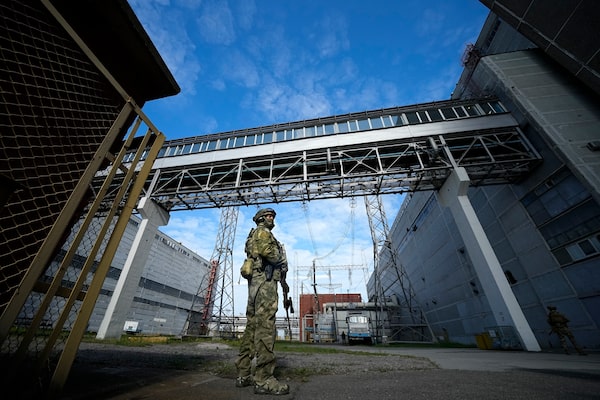
A Russian serviceman guards an area of the Zaporizhzhia nuclear power station in territory under Russian military control, in southeastern Ukraine, on May 1.The Associated Press
Shelling on Tuesday damaged a backup power line at the Russian-held Zaporizhzhia nuclear power plant (ZNPP) in Ukraine, which has already lost all four of its regular power lines, the UN nuclear watchdog said in a statement on Wednesday.
The International Atomic Energy Agency (IAEA) said there was no immediate impact from the damage to one of its three backup power lines because the plant was already disconnected from the grid.
Like all nuclear power plants, Zaporizhzhia needs power to keep cooling the nuclear fuel in its reactors and its spent fuel. Its one operating reactor is supplying power but with each external power line that goes down, it loses a line of defence against potential nuclear meltdown.
Russia has gained, not lost, from the conflict in Ukraine, Putin says
EU plans to cap Russian gas price as Putin warns West of winter freeze
“Of the three backup lines between the ZNPP and the thermal power station, one is now damaged by shelling, while the two others are disconnected, senior Ukrainian operating staff informed IAEA experts present at the plant since last week,” the IAEA statement said, referring to a nearby coal-fired plant.
Russia and Ukraine have blamed each other for shelling that has occurred close to the plant and within its perimeter, risking nuclear catastrophe. Russian forces took over the plant soon after their Feb. 24 invasion of Ukraine but Ukrainian technicians still operate the power station.
Another of the backup lines was disconnected earlier this week to extinguish a fire. Zaporizhzhia in southern Ukraine has six reactors and is Europe’s biggest nuclear power plant.
Ukraine weighs shutdown, urges evacuations
Ukraine said on Wednesday it might have to shut down the nuclear plant to avoid a disaster and called on residents in areas near the embattled facility to evacuate for their own safety. Shutting down the vast, six-reactor nuclear plant would pile further strain on Ukraine which is bracing for a winter of energy shortages as the war rages on in its east and south.
“The option of switching off the station is being assessed, if conditions necessitating the station to be switched off arise,” Oleh Korikov, acting head of Ukraine’s State Nuclear Regulatory Inspectorate, told a news briefing.
He said the facility was supplying its own electricity needs, but that backup diesel generators would have to be fired up if it remained disconnected, though he gave no time frame.
“We could potentially reach a situation where the diesel runs out, which would cause an accident involving the damage of the active zones of the reactors, which would cause the expulsion of radioactive substances into the environment,” he said.
Deputy Prime Minister Iryna Vereshchuk urged Ukrainians living near the plant to evacuate. “Find a way to get to (Ukrainian) controlled territory,” she wrote on Telegram.
General warns of Russian nuclear strike risk
In rare public comments Ukraine’s military chief warned on Wednesday of the threat of Russia using nuclear weapons in Ukraine, which would create the risk of a “limited” nuclear conflict with other powers.
The war in Ukraine that began with Russia’s invasion on Feb. 24 was likely to rage on into next year, General Valeriy Zaluzhnyi said in an article co-authored by lawmaker Mykhailo Zabrodskyi and published by state news agency Ukrinform.
The article contained by far the Ukrainian commander-in-chief’s most detailed assessment of the war to date, and gave starkly contrasting messages to those given by top Ukrainian officials.
“There is a direct threat of the use, under certain circumstances, of tactical nuclear weapons by the Russian Armed forces,” Zaluzhnyi said.
“It is also impossible to completely rule out the possibility of the direct involvement of the world’s leading countries in a ‘limited’ nuclear conflict, in which the prospect of World War Three is already directly visible,” the article said.
Moscow has in the past denied speculation of potential nuclear or chemical weapons use.
Ukraine will need to match the strike range of Moscow’s weapons in order to turn the tide of the war, Zaluzhnyi and Zabrodskyi wrote.
“The only path to a cardinal change in the strategic situation is undoubtedly a series of several consecutive, or ideally simultaneous, counterstrikes by Ukraine’s armed forces during the 2023 campaign,” they said.
Additional reporting by Max Hunder and Tom Balmforth
Our Morning Update and Evening Update newsletters are written by Globe editors, giving you a concise summary of the day’s most important headlines. Sign up today.